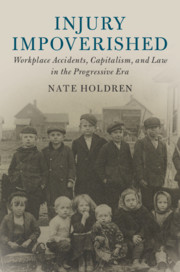Book contents
- Injury Impoverished
- Cambridge Historical Studies in American Law and Society
- Injury Impoverished
- Copyright page
- Epigraph
- Contents
- Tables
- Acknowledgments
- Introduction
- Part I The Eclipse of Recognition and the Rise of the Tyranny of the Table
- Part II New Machineries of Injustice
- 4 The Disabling Power of Law and Market
- 5 Insuring Injustice
- 6 Discrimination Technicians and Human Weeding
- Conclusion
- Coda
- Index
4 - The Disabling Power of Law and Market
from Part II - New Machineries of Injustice
Published online by Cambridge University Press: 06 April 2020
- Injury Impoverished
- Cambridge Historical Studies in American Law and Society
- Injury Impoverished
- Copyright page
- Epigraph
- Contents
- Tables
- Acknowledgments
- Introduction
- Part I The Eclipse of Recognition and the Rise of the Tyranny of the Table
- Part II New Machineries of Injustice
- 4 The Disabling Power of Law and Market
- 5 Insuring Injustice
- 6 Discrimination Technicians and Human Weeding
- Conclusion
- Coda
- Index
Summary
Chapter 4 begins the book’s second half, focusing on the aftermath of compensation laws. The chapter investigates lawsuits brought by men who were employed while physically disabled and who then suffered further disabling injury. The chapter uses disability as a category of analysis to show that disability is a social and historical power relationship that changes over time. These men did not fit into the categories of compensation laws because those laws introduced a new assumption into the law that so-called normal employees were non-disabled. This assumption was out of step with the social realities of widespread injury and the employment of people with disabilities. The mismatch between law and social reality meant that these men ended up in court over their compensation claims. The chapter uses these men’s legal cases to show how the law practiced a variety of forms of discrimination against disabled people and ultimately created new legal and economic meanings of disability. In the end, courts made disabled men more legally equal to the able-bodied by valuing their injuries equally. The courts who did so believed that raising the value of disabled men’s injuries would create new employment discrimination against the disabled.
Keywords
- Type
- Chapter
- Information
- Injury ImpoverishedWorkplace Accidents, Capitalism, and Law in the Progressive Era, pp. 137 - 174Publisher: Cambridge University PressPrint publication year: 2020



